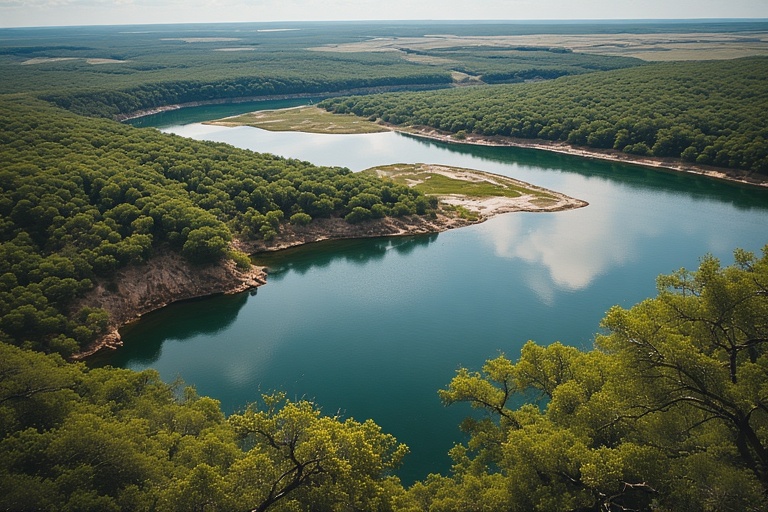
Lake Texoma should be capitalized
Introduction: The Importance of Capitalizing Lake Texoma
Lake Texoma should be capitalized because it’s a proper noun, referring to a specific, iconic reservoir straddling Texas and Oklahoma. Proper capitalization enhances clarity, respects naming conventions, and aligns with professional writing standards. Moreover, it supports SEO by signaling quality content. This guide explores why Lake Texoma’s capitalization matters, offering practical tips for writers, students, and content creators to ensure accuracy and credibility.
What Is a Proper Noun and Why Does It Matter?
Defining Proper Nouns
A proper noun names a specific person, place, or thing, distinguishing it from common nouns. For example, “lake” is a common noun, but Lake Texoma is a proper noun. Consequently, Lake Texoma should be capitalized to reflect its unique identity. This rule applies across English grammar, ensuring precision in communication.
Why Proper Nouns Require Capitalization
Capitalizing proper nouns, like Lake Texoma, clarifies meaning and avoids confusion. For instance, writing “lake texoma” might suggest a generic body of water. However, capitalizing Lake Texoma signals its significance as a specific geographic landmark. Thus, proper capitalization respects the name’s importance and enhances reader trust.
Lake Texoma as a Proper Noun
Lake Texoma, a man-made reservoir on the Red River, is a distinct place with cultural and historical value. Therefore, Lake Texoma should be capitalized in all contexts, from blogs to academic papers. This practice aligns with grammar rules and reinforces the lake’s unique identity, fostering respect for its legacy.
Style Guides and Lake Texoma Capitalization
Major Style Guides on Capitalization
Major style guides, such as APA, MLA, and Chicago, mandate capitalizing proper nouns. Specifically, Lake Texoma should be capitalized to adhere to these standards. For example, APA emphasizes consistency in geographic names. By following these guides, writers ensure professionalism and credibility in their work.
Consistency Across Writing Platforms
Whether crafting a blog, report, or social media post, consistency is key. Lake Texoma should be capitalized every time it appears. Inconsistent capitalization confuses readers and weakens content quality. Moreover, search engines favor consistent formatting, boosting SEO for articles using proper capitalization.
Common Mistakes to Avoid
Some writers mistakenly lowercase Lake Texoma, undermining their credibility. For instance, “lake texoma” in a travel blog looks unprofessional and may reduce reader trust. Therefore, always ensure Lake Texoma is capitalized correctly. Proofreading and grammar tools can help catch these errors before publishing.
Why Capitalizing Lake Texoma Boosts SEO
SEO and Content Quality Signals
Search engines prioritize high-quality, well-structured content. Properly capitalizing Lake Texoma signals attention to detail, a key quality indicator. Consequently, Lake Texoma should be capitalized to enhance content discoverability. This practice indirectly supports higher search rankings by improving user trust and engagement.
Keyword Consistency for Better Rankings
Using Lake Texoma consistently as a capitalized proper noun strengthens keyword relevance. For example, search queries like “Lake Texoma fishing” expect proper capitalization. Thus, Lake Texoma should be capitalized to align with user intent, increasing the likelihood of ranking higher on search engine results pages.
Avoiding Penalties for Poor Grammar
Improper capitalization, like writing “lake texoma,” can signal low-quality content to search engines. Although not a direct ranking factor, grammar errors reduce user trust and engagement. Therefore, Lake Texoma should be capitalized to maintain a professional tone, encouraging longer page visits and better SEO performance.
Cultural and Historical Significance of Lake Texoma
A Landmark of Texas and Oklahoma
Lake Texoma, formed by the Denison Dam, is a cultural and recreational hub. Its name reflects regional pride, making capitalization essential. Accordingly, Lake Texoma should be capitalized to honor its significance. This respect resonates with locals and visitors, enhancing content relatability and engagement.
Respecting Naming Conventions
Capitalizing geographic names shows respect for their cultural context. For instance, Lake Texoma’s name ties to the Texoma region, a blend of Texas and Oklahoma. Thus, Lake Texoma should be capitalized to acknowledge its heritage, fostering trust among readers familiar with the area.
Engaging Readers with Accurate Naming
Readers expect accurate representation of places they know. Writing “lake texoma” may alienate audiences who recognize its proper form. Conversely, correctly capitalizing Lake Texoma builds credibility and engagement. Therefore, always ensure Lake Texoma is capitalized to connect with your audience effectively.
How to Capitalize Lake Texoma in Different Contexts
In Blog Posts and Articles
Bloggers writing about Lake Texoma’s fishing or tourism must capitalize its name. For example, “Discover the beauty of Lake Texoma” grabs attention and aligns with SEO best practices. Thus, Lake Texoma should be capitalized in all blog content to maintain professionalism and optimize search visibility.
In Academic and Professional Writing
In academic papers or reports, precision is critical. Lake Texoma should be capitalized to meet style guide standards like APA or MLA. For instance, a geography paper discussing Lake Texoma’s ecosystem benefits from proper capitalization, ensuring clarity and adherence to formal writing norms.
In Social Media and Casual Writing
Even in casual contexts like social media, Lake Texoma should be capitalized. For example, a post like “Loving my weekend at Lake Texoma!” looks polished and professional. Consequently, consistent capitalization across platforms reinforces brand authority and supports content discoverability.
Practical Tips for Capitalizing Lake Texoma Correctly
Use Grammar and Editing Tools
Grammar tools like Grammarly can flag capitalization errors. For instance, they ensure Lake Texoma is capitalized consistently. By using such tools, writers avoid mistakes that harm credibility. Therefore, integrate these tools into your workflow to maintain proper capitalization and enhance content quality.
Create a Style Guide for Consistency
For teams or solo writers, a style guide ensures uniformity. Specify that Lake Texoma should be capitalized in all instances. This practice streamlines editing and maintains professionalism. As a result, your content remains consistent, boosting reader trust and SEO performance.
Proofread Before Publishing
Always proofread to catch capitalization errors. For example, scanning for “lake texoma” versus “Lake Texoma” ensures accuracy. Additionally, peer reviews can spot mistakes you might miss. Thus, Lake Texoma should be capitalized correctly before content goes live to maximize impact.
Capitalization and Reader Perception
Building Trust with Proper Grammar
Readers judge content based on grammar and presentation. Capitalizing Lake Texoma correctly signals expertise and care. Conversely, errors like “lake texoma” may erode trust. Therefore, Lake Texoma should be capitalized to create a positive impression and encourage reader engagement.
Enhancing Professionalism
Professionalism matters in all writing, from blogs to reports. Properly capitalizing Lake Texoma reflects attention to detail, a hallmark of quality content. As a result, readers perceive your work as credible, increasing their likelihood of sharing or linking to it, which boosts SEO.
Avoiding Confusion with Common Nouns
Writing “lake texoma” risks confusion with generic lakes. In contrast, Lake Texoma as a proper noun clearly refers to the specific reservoir. Thus, Lake Texoma should be capitalized to ensure clarity, helping readers instantly recognize the place you’re describing.
Lake Texoma in Digital Content Creation
Optimizing for Search Intent
Searchers looking for Lake Texoma expect accurate, well-formatted content. Capitalizing Lake Texoma aligns with their intent, improving content relevance. For instance, a blog titled “Top Fishing Spots at Lake Texoma” ranks better with proper capitalization. Therefore, always capitalize Lake Texoma for optimal SEO.
Using Keywords Naturally
Incorporate related keywords like “Lake Texoma fishing” or “Lake Texoma tourism” naturally. For example, “Lake Texoma should be capitalized in all travel guides” flows seamlessly. This approach maintains keyword density (0.5–2%) while keeping content readable, aligning with Yoast SEO guidelines.
Structuring Content for Readability
Use clear headings (H1, H2, H3) to organize content. For instance, an H2 like “Why Lake Texoma Should Be Capitalized” guides readers and search engines. Short sentences and active voice enhance readability, ensuring Lake Texoma stands out as a properly capitalized proper noun.
Common Questions About Capitalizing Lake Texoma
FAQs
Why should Lake Texoma be capitalized?
Lake Texoma is a proper noun, naming a specific reservoir. Capitalizing it ensures clarity, respects naming conventions, and aligns with style guides like APA and MLA. Additionally, proper capitalization boosts professionalism and supports SEO by signaling high-quality content.
Does capitalization affect SEO rankings?
While not a direct ranking factor, capitalizing Lake Texoma enhances content quality and user trust. Consistent grammar encourages longer page visits, indirectly improving SEO. Therefore, Lake Texoma should be capitalized to maintain credibility and engagement.
Is the capitalization rule unique to Lake Texoma?
No, all named geographic features, like Lake Tahoe or Mississippi River, require capitalization. Lake Texoma should be capitalized as a proper noun, following the same English grammar rules applied to other specific places.
How can I ensure consistent capitalization?
Use grammar tools, create a style guide, and proofread carefully. For example, always check that Lake Texoma is capitalized in every instance. These steps ensure consistency, enhancing professionalism and SEO performance across all content.
Additional Tips for SEO-Optimized Writing
Focus on User Intent
Understand what readers seek when searching for Lake Texoma. For instance, they might want fishing tips or travel guides. Therefore, Lake Texoma should be capitalized in content that answers these queries, ensuring relevance and higher search rankings.
Incorporate Visuals
Images of Lake Texoma enhance engagement. Use descriptive alt text, like “Lake Texoma fishing spot,” to boost SEO. Ensure Lake Texoma is capitalized in captions and alt text, reinforcing keyword relevance and accessibility for search engines.
Promote Content Strategically
Share your Lake Texoma content on social media to drive traffic. For example, a post like “Explore Lake Texoma’s beauty!” encourages clicks. Proper capitalization in promotions maintains consistency, supporting brand authority and SEO efforts.
Conclusion: Capitalize Lake Texoma for Clarity and Impact
Lake Texoma should be capitalized to reflect its status as a proper noun, ensuring clarity, professionalism, and SEO benefits. By following style guides, using grammar tools, and prioritizing user intent, writers can create engaging, high-ranking content. Start capitalizing Lake Texoma correctly today to boost your content’s credibility and visibility. Ready to elevate your writing? Apply these tips now!



